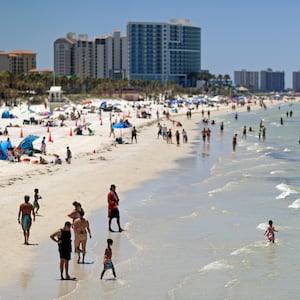For two months, Ken Averett Clark couldn’t lift weights at his local gym in Fort Lauderdale, the city with the third-highest number of confirmed coronavirus cases in Florida. But by late Monday, the buff 55-year-old was closing in fast on pumping iron in public once again.
“For me, going to the gym is one of the pillars of my mental and physical health,” Clark told The Daily Beast. “I really feel like there is something missing in my life. I understand some people see it as a luxury that I can do without, and could do a home exercise regimen. For me, it’s not the same.”
On Friday, Fort Lauderdale Mayor Dean Trantalis decided gym rats like Clark could return to their workout spaces, announcing commercial health clubs were among the nonessential businesses that would reopen this week with new safety precautions. But Trantalis’s move to reopen gyms came in spite of officials in Broward County—which includes the city—insisting gyms remain closed, at least for now.
At a Monday afternoon press conference in a hotel lobby attended by more than two dozen people, Trantalis asserted Gov. Ron DeSantis’ executive order allowing gyms to reopen trumped Broward’s directive. “It is our position that gyms can be opened,” Trantalis told face mask-wearing reporters. “There is a dispute between the county and the city with regard to that order. As far as we are concerned, we should be able to resolve it by tomorrow.”
When asked if Fort Lauderdale gym owners who moved forward with reopening should be concerned about being shut down or arrested by county law enforcement, Trantalis replied, “No one is going to be arrested.”
But Broward Vice Mayor Steve Geller told The Daily Beast it was “possible” Broward code enforcers and sheriff’s deputies would go to Fort Lauderdale to make sure gyms remain closed until the county says otherwise. County Commissioners voted to send the city a warning letter on Tuesday. “We don’t need to have a confrontation,” Geller said. “I am sure we can work it out. This requires compromise from both parties and not just the county giving in.”
In the Sunshine State, working on one’s summer body is the stuff of obsession. Last week, more than two dozen people performed squats and push-ups sans face masks outside a courthouse in Clearwater, a city in central Florida, as part of a reopening protest. The gym crowd, in other words, is starting to get fed up, and health experts worry that could turn gyms into high-risk contamination zones even as the state’s COVID outlook remains murky at best.
Meanwhile, Trantalis' decision to reopen gyms has divided residents in his city.
Stephanie Lavender, a 56-year-old artist and designer, said she was shocked and disappointed Trantalis was moving to reopen gyms ahead of the county’s timeline. “When this first started, the mayor took initiative when others did not,” she told The Daily Beast. “Fort Lauderdale and Miami Beach were among the first cities to do stay-at-home orders and then required masks. I felt safe.”
She also questioned how gyms would be able to keep equipment clean after every use. “Gyms have the most touch points, even more than a restaurant or bar,” Lavender said. “And people are breathing hard. It's a strong exhale. I know we have to get back to normal, but this doesn’t seem to fit with the rest of the reopening.”
It’s unclear if Trantalis has been feeling the heat from gym-goers in his city—at the press conference, he declined to divulge his motivation other than insisting DeSantis had said it was safe to do so statewide. Meanwhile, between May 16 and May 19, Fort Lauderdale recorded 22 new coronavirus cases, bringing the city’s total to 1,465. Overall, Broward saw its total number of cases jump by 121 over the same three-day period. Those are relatively modest totals, but the city’s proximity to the state’s No. 1 hot zone—in Dade County, currently beginning its own reopening process—was not exactly cause for reassurance.
“It’s a terrible thing that fitness clubs may be some of the small businesses that don’t survive,” said Dr. Lisa Brosseau, an expert on respiratory protection who taught at the University of Illinois. “Unfortunately, the risk to the population as a whole trumps the individual. A health club is not going to know who is or has been infected. And the more time you spend with people, the more exposure you get.”
Trantalis did insist Fort Lauderdale was enacting stricter guidelines for gyms to reopen than the ones enacted by the state’s Department of Business and Professional Regulation. But he promptly admitted the city would not be cracking down on businesses. “Much of it is going to be based on the honor system,” he said. “We are not going to post a police officer on every corner… We are not about criminalizing the recovery.”
Clayton Foltz, owner of Powerhouse Gym and a member of Trantalis’ economic recovery task force, laid out the new gym rules for reporters. He noted that, for instance, employees would be required to wear face masks, and staff and clients would have their temperatures taken before entering a health club. “If they yield a temperature of 100 or greater, they will be denied entry,” he explained. “Equipment will be spaced out six feet or greater. I can’t think of one gym that won’t have to move their cardio, fan it out, and create some separation.”
However, the rules don’t mandate gym members wear masks, nor do they mandate health clubs use air filtration and sanitation systems.
Foltz said the gym regulations take into account guidelines from the Centers for Disease Control and Prevention (CDC), but acknowledged gym-goers were responsible for taking care of their own well-being. “The aim here is to reduce the potential for health clubs to become vectors of transmission,” Foltz said. “We are expecting members to do their part as we do ours.”
Still, Foltz said he had no intention of reopening until Fort Lauderdale and Broward sort things out. “Right now, the directive is unclear,” he explained. “In the meantime, we are going to train our staff on these new guidelines and make sure our inventory on sanitizers and wipes is robust.”
Brosseau argued Fort Lauderdale’s guidelines don’t appear to do enough to prevent community spread. The scholar has previously pointed to mounting evidence that COVID-19 transmission may occur via aerosols—or smaller viral particles produced during exhalation when a person talks, sings, or exercises.
That should be a great concern for gym owners, she added.
“I worry that you would have an aerosol production that is so excessive that it poses a risk even if people are wearing cloth masks,” Brosseau told The Daily Beast. “Particles can remain suspended in the air, and studies show the virus is viable for a long period of time.”
She went on to argue gym owners should consider adding air purifying controls to air conditioning systems that can filter infectious particles—or using multiple store-bought air purifiers.
Clark, who is a member of Powerhouse Gym, said he would likely wait a week until after his health club reopened to resume his workout routine. A realtor and a professional actor, Clark said he polled people on his Facebook page about gyms reopening. “I got about 60 responses and almost every single one of them was no,” he said. “I was surprised.”
But going to the gym provided him an outlet to cope with two recent, traumatic events. In late February, Clark said, he was in northern California to be with his 76-year-old mother, who came down with COVID-19. She was on a ventilator for five days before she could breathe on her own again, he recalled.
“But I had to come back to Fort Lauderdale earlier because my partner fell and was taken to the ICU with a brain bleed,” Clark said.
Clark returned to Fort Lauderdale on March 8. About 10 days later, Trantalis ordered all bars, nightclubs, and gyms be closed to slow the spread of the coronavirus.
“Going to the gym was propping me up,” Clark said. “It was my outlet, and then it was just gone.”






